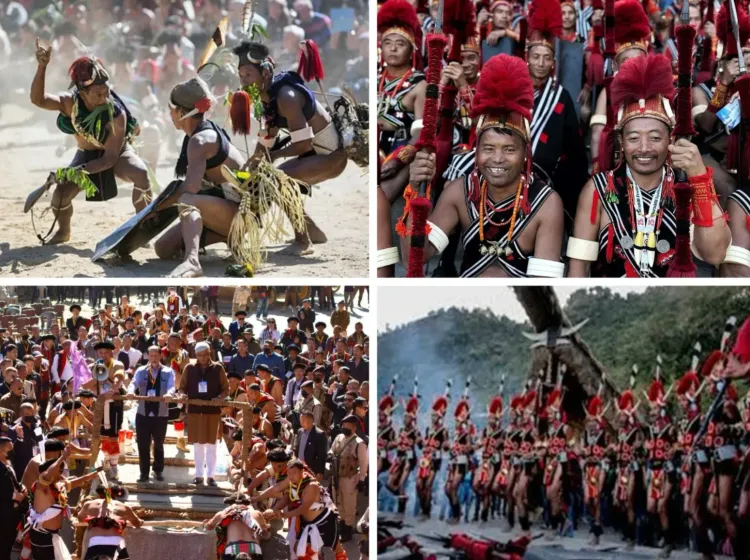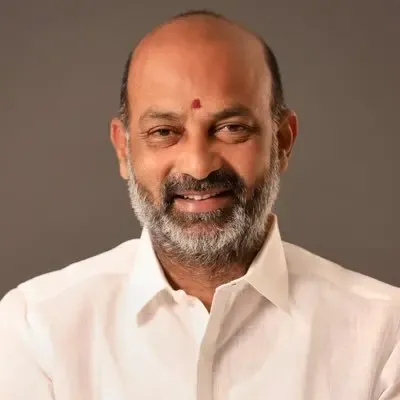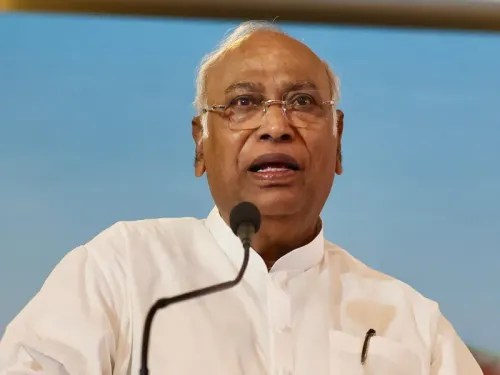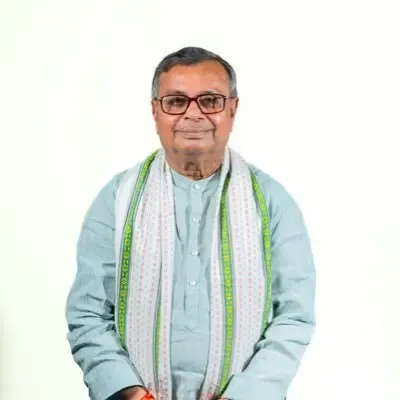Nagaland: Day 4 of the Hornbill Festival Showcases Exceptional Cultural Performances

Kohima, Dec 4 (NationPress) The 25th-anniversary festivities of the 10-day Hornbill Festival proceeded into its fourth day under the theme “Cultural Connect”. This year’s event showcased an impressive selection of traditional performances from the diverse tribes of Nagaland, which comprises 17 distinct tribes, each with its own vibrant festivals.
The cultural display on Wednesday commenced with a performance by the Tikhir cultural troupe, who presented Thulu Tong Nu Koyatu Nong Nong Khin, a men’s folk song traditionally sung during the return from the fields.
This song, serving as a unique form of expression when words fail, enchanted the audience with its distinctive narrative style.
Next, the Sumi tribe showcased Akhe Shikeu/Aqhe Kishi, a dynamic war dance exclusively performed by male villagers to exhibit their strength and warrior prowess. The vigorous and synchronized movements effectively communicated the tribe’s martial spirit and camaraderie.
To mark the festival’s silver jubilee, the Lotha cultural troupe performed Rhejung Tokhu Jubilee Nsika, a celebratory dance. The Rengma tribe contributed with Akha Khi Kemvü, a song sung while spinning cotton threads, while the Pochury troupe engaged the audience with Tsupongho Tsutsongho Chonwi, a victory dance rooted in historical headhunting traditions.
The Chakesang troupe captivated spectators with a spirited war dance known as Khrokechü, symbolizing bravery and the role of the village protector. In contrast, the Konyak tribe offered a gentle lullaby titled Nao Aepu, sung by women to honor and bless infants.
Women performers from the Sangtam tribe exhibited Aptarü Nyichiba, a celebratory dance performed in the homes of village chiefs, who express gratitude with offerings of rice and pork. The morning session concluded with the Kachari cultural troupe delivering Barishing Ha Khim Gaiba, a post-harvest folk dance that pays tribute to honored guests.
The event highlighted the rich cultural heritage of Nagaland’s tribes, promoting a deeper appreciation for their traditions and unity in diversity.
The Phom cultural troupe performed Cheihdungla, an indigenous song and dance where varying sizes of a Mithun's horn are skillfully aligned to create divine musical tones.
The Angami cultural troupe presented a folk song called Chaze Pfhe, a traditional melody sung by Angami women while spinning cotton yarn for making traditional shawls, mekhalas, bags, and more.
The Ao cultural troupe entertained the crowd with a mesmerizing warrior dance, where the dancers entered the stage chanting to celebrate with the audience. Their energetic chants and dances were accompanied by the finest drum beats and colorful costumes.
The Chang cultural troupe showcased Theai, a commemorative performance by women who sing while weaving and spinning yarn in harmonious rhythm.
Performing Anding O'ka, a traditional game of the Garo tribe, the Garo cultural troupe demonstrated a playful contest where two young lads face each other holding a bamboo baton, attempting to pull it towards themselves, with the winner pulling it away from the opponent.
The Khiamniungan cultural troupe illustrated Oum Kie Ao, a traditional belt-making method. Meanwhile, the Kuki cultural troupe entertained the crowd with a medley of folk dances called Hal Ngai Lam, meaning the dance of healing and rejuvenation.
The Yimkhiung cultural troupe presented Khohto Khun, a folk song that generates a blissful melody and celebrates the beautiful chirping of the Barbet in the wild forest.
Concluding the day’s performances, the Zeliang cultural troupe exhibited Kagiuna Lin, a Honey Bee Dance performed during auspicious occasions where youth attempt to enchant their lovers, fostering romantic connections.
Union Minister of Culture and Tourism, Gajendra Singh Shekhawat, attended the performances at the Hornbill Festival on Tuesday.
Showcasing the traditional and diverse culture, customs, and vibrant lifestyle of Nagaland, the 10-day Hornbill Festival commenced on December 1 at the picturesque Naga heritage village Kisama, located 12 km from Kohima.
The silver jubilee edition of the festival features a collaborative cultural experience with partners from Japan, the USA, the United Kingdom (Wales), Peru, and Bulgaria, while Sikkim and Telangana are the partner states.
The festival also pays tribute to the magnificent Hornbill, a bird held in high regard by the Naga people for its alertness and grandeur.









